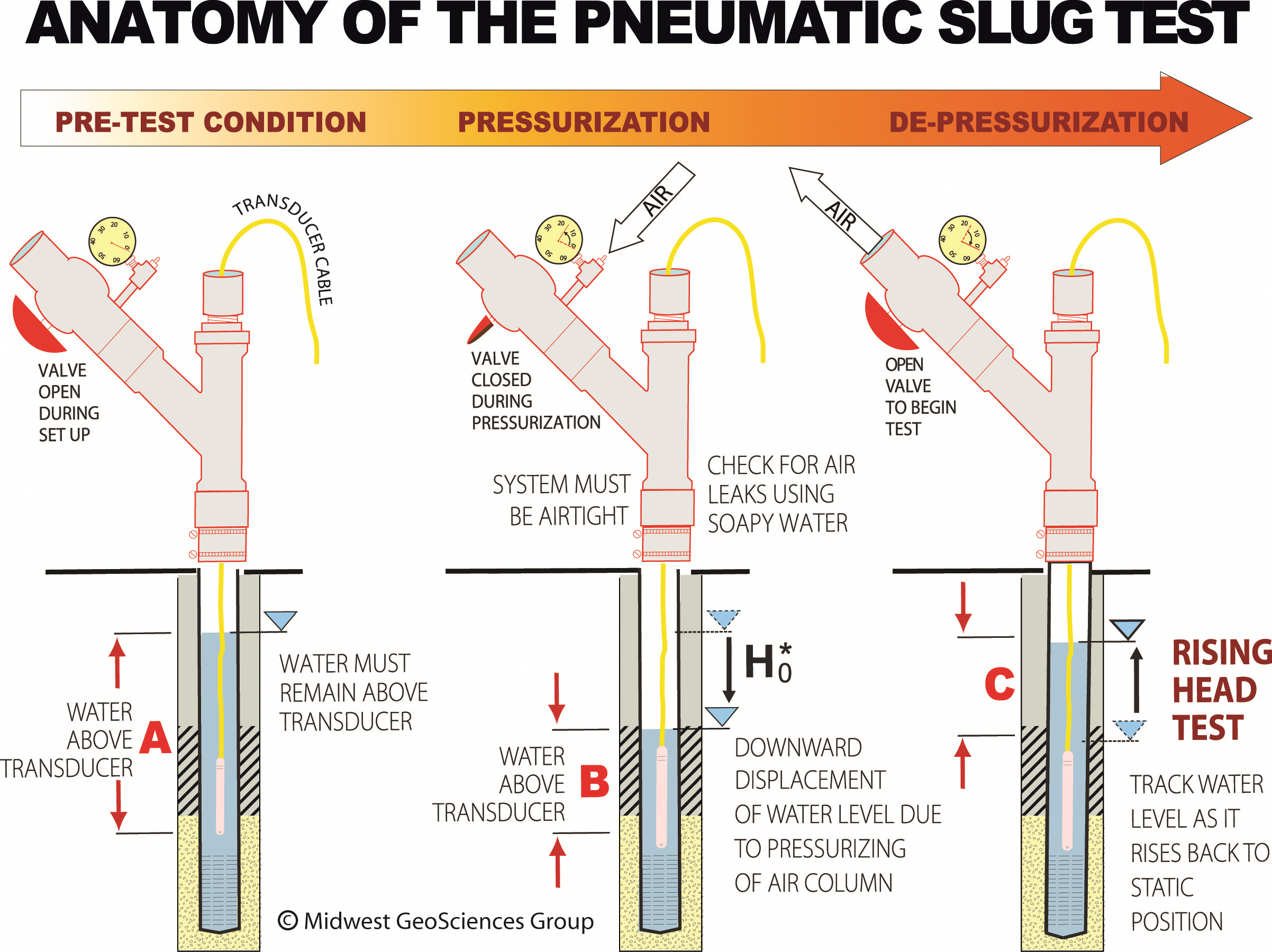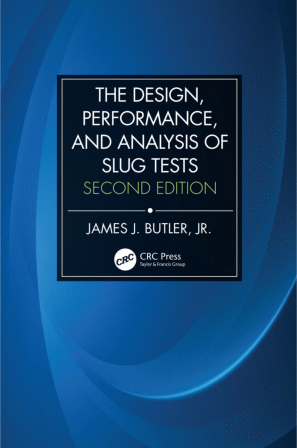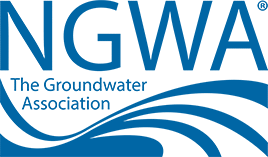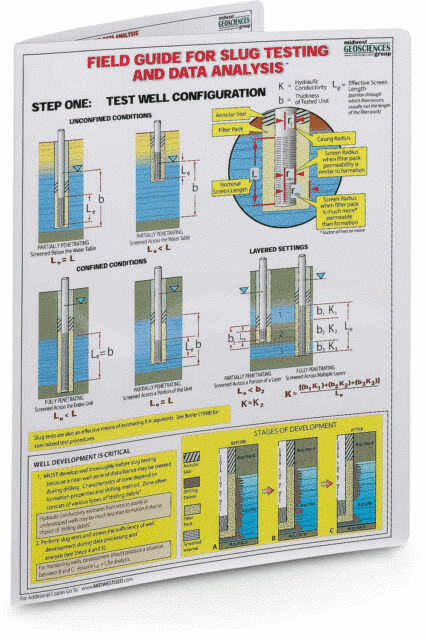
SLUG TESTING STRATEGIES
for Challenging Conditions
Designed and priced for the Individual
(at home or in the office)
Despite the popularity and frequency of slug testing, difficulties still exist with design and analysis. Questions about parameters, field screening, data collection, and analysis strategies continue to challenge professionals.
Sometimes these challenges emerge because of the conceptually simple nature of slug testing or lack of meaningful training. Many challenges can be easily overcome by simply learning the key steps that make slug testing more reliable - and easier to do with confidence.
For example, high-permeability formations deserve special attention because of the challenges in collecting reliable data when the test duration is only several to a few tens of seconds. A pneumatically initiated test is one approach for improving the quality of data from tests in high-permeability formations, but it is not the only strategy.

Low-permeability formations pose their own kind of challenge. How can you obtain timely data when the test duration can be extremely long? What strategies exist to obtain reliable data in a reasonable time?
Data analysis can be daunting too. Selecting the most appropriate solution is important for ensuring the validity of the results. Plus, there are efficiencies in the analysis process that most of us do not apply because we never learned about them in school.
Webinar participants will learn the key steps they need to get reliable information from slug tests. Plus they will learn the strategies for successful slug testing in formations with extremely high or low hydraulic conductivity - the bane of hydrogeologists.
Much of the field and theoretical research on slug tests over the last decade has been done by Jim Butler and colleagues. Jim's work is widely recognized by the academic, consulting, and regulatory communities as having led to significant advances in the state of the practice for slug testing.
Jim Butler co-teaches the Midwest Geosciences aquifer testing course (with Glenn Duffield) where he spends an entire course segment on slug testing in formations of high and low hydraulic conductivity. In this webinar, Jim will summarize that material as well as discuss approaches for everything in between those extreme settings.
Whether you want to learn more about slug tests in material of very high or low hydraulic conductivity, this webinar will provide attendees with information that is not available elsewhere on the web.

THE SECOND EDITION HAS ARRIVED!
The Design, Performance, and Analysis of Slug Tests (2nd Edition)
by Jim Butler, Ph.D.
And is available with this webinar for an additional charge.
CONGRATULATIONS TO JIM BUTLER!
 Jim Butler, senior scientist and geohydrologist at the Kansas Geological Survey, is the 2020 recipient of the National Ground Water Association's M. King Hubbert Award.
Jim Butler, senior scientist and geohydrologist at the Kansas Geological Survey, is the 2020 recipient of the National Ground Water Association's M. King Hubbert Award.
The association's highest scientific honor, the award is given annually for major scientific or engineering contributions that advance the understanding of groundwater through research, writing, teaching, and practical applications.
| Fee: |
149.00 USD
Per Computer Site for our Members
199.00 USD Per Computer Site for Non-Members
|
| Instructor: |
Jim Butler, Ph.D. |
|
| Handouts: |
Webinar Slides (pdf)
Additional Materials
• SLUG TESTING REFERENCES (pdf)
Record of Attendance Form (pdf)
|
| Participants: |
This webinar is designed for individual participants. Terms and Conditions Apply.
|
| Continuing Education Certificates: |
$14.95 each. Official CEU certificates are available as an option. After successful completion of this webinar, a link will be provided to order a certificate.
|
| Included: |
FIELD GUIDE FOR SLUG TESTING
By Midwest GeoSciences Group

|
| Duration: |
1.5 hour plus Q&A
(no restrictions on time limit for extra Q&A!)
|
Professional
Development: |
Earn 1.5 Professional Development Hours (1.5 PDH)
 |
A Record of Attendance Form is included free with each webinar for your record keeping and individual PDH verification. We ask your on-site coordinator to return the completed and signed copy of the Form to us following the webinar for (1) maintaining a separate copy as a service to attendees and (2) forwarding to NIU confirming attendance for those who order certificates.
Attendees may also order an official a Course Completion Certificate from Northern Illinois University for a small administrative fee. The Certificate is optional and may be ordered separately following the webinar to confirm your attendance and showcase the certificate on your office wall. Instructions for ordering certificates are given during the webinar.

* This webinar is eligible for the 'BUY THREE, GET THREE' discount; however ANY webinar series discount shown above cannot be combined with it.
Attendees will be invited to actively participate during this live and interactive on-line web seminar. Discussion is planned following the webinar for those who want to continue the session. Bring your questions to the webinar and present them to the instructor and other participants for exploring the best solution.
Instructor Bio
Jim Butler, Ph.D.
 Jim Butler is the author of "The Design, Performance, and Analysis of Slug Tests" (Second Edition). He currently is a Senior Scientist in the Geohydrology Section of the Kansas Geological Survey at the University of Kansas, where he has worked for over 30 years.
Jim Butler is the author of "The Design, Performance, and Analysis of Slug Tests" (Second Edition). He currently is a Senior Scientist in the Geohydrology Section of the Kansas Geological Survey at the University of Kansas, where he has worked for over 30 years.
His research interests include aquifer testing, assessment of aquifers that support irrigated agriculture, high-resolution subsurface characterization, well responses to natural and anthropogenic stimuli, and the role of phreatophytes in stream-aquifer systems.
Jim holds a B.S. in Geology from the College of William and Mary, and a M.S. and Ph.D. in Applied Hydrogeology from Stanford University. Jim was the 2007 Darcy Distinguished Lecturer of the National Ground Water Association (NGWA), the 2009 Pioneers in Groundwater Award honoree by the American Society of Civil Engineers - Environmental and Water Resources Institute, and, most recently, the 2020 recipient of NGWA's M. King Hubbert Award.
Jim helps advance the environmental and engineering industry through teaching professionals about both slug testing and pumping tests. Jim has taught more than 40 courses with Midwest GeoSciences Group. This webinar is another step toward that advancement and we are grateful to have Jim Butler teach this purposeful and applied webinar.